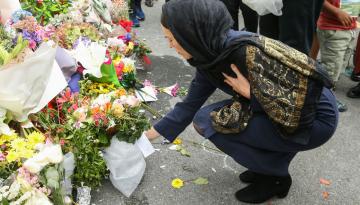Green Party MP Golriz Ghahraman looks back on what we've learned in the year since the Christchurch mosque attacks.
OPINION: A year on from the worst act of terror in our nation's recent history, the wound is still fresh. As is the love, which poured out all over our country. We wrapped our arms around the survivors at mosques, gathered and held each other at vigils, held our little ones a little tighter as we remembered that little Mucad Ibrahim, at three years old, was one of the victims that Friday. The city of Dunedin ran out of flowers by Saturday. They were all at the mosque.
The cut was deep, and the sorrow resonates, but for the targeted communities - our Muslim, migrants of colour and refugee communities - there is also enduring fear. If we are to uphold the legacy of the unconditional love that surfaced on 15 March last year, we must translate it to real change, real inclusion, and substantive equality. A year on, we see division still in pockets in our communities, on university campuses and online. We see racial prejudice rise even in reaction to a medical emergency.
That love and kindness that the world commended us for last March, is the New Zealand which welcomed me and my family when we fled oppression, the risk of torture, after we had lived through war. I will never forget that love as a nine-year-old girl coming down that escalator in Auckland Airport with my frightened parents.
A Syrian refugee family were among the victims of this terror attack. Like my family, they escaped the unthinkable and found freedom here. They came here to be safe. They died in Christchurch, New Zealand.
The Christchurch mosque terrorist attack was planned at length without police interference because white supremacy was not seen as a pressing threat, though the Muslim victims had been- though Māori are targeted by our law-enforcement institutions so harshly. In fact, it was Māori who first amplified the voices of the Muslim community in March last year. When for a moment it seemed possible that we would write this off as an aberration to absolve the status quo, it was tangata whenua who said, 'this is us'. This ideology hurt Māori first, and continues to hurt our communities. Learning our history, bravely, is part of ensuring change.
It turned out, the Muslim community had been telling us it exists for years. They have reported discrimination for years.
The truth is that this is a global phenomenon. And political leaders must tread carefully not to inflame discrimination here in New Zealand.

We, as politicians - on both sides of our political spectrum, in every party - must look at ourselves, especially in an election year. The politics of division and prejudice have no place in Aotearoa. We are now all on notice. We have to change the way we do politics here.
Our most vulnerable communities are hurt and scared.
The people at those incredible vigils are watching. They expect the best of us. Their acts of love, their resolve, is the standard we have to hold ourselves to from now on.
The world is watching. We have to get this right. We have to continue to demonstrate that love, peace, and compassion is a far stronger force than hate and division. We must be brave as we have the hard conversations we need to have as a country. We must make space for the voices of marginalised communities, we must share decision-making because our institutions must be transformed to serve us all, keep us all protected and equal.
We must keep weaving the incredible outpouring of love for our Muslim and migrant communities that we saw in the wake of terror, into the enduring fabric of our society.
We have to do this for all the families who have had the lives of loved ones taken from them. We have to do this for little Muscad Ibrahim.
Kia hora te marino. May peace be widespread.
Kia whakapapa pounamu te moana. May the ocean become like pounamu.
Aroha atu, aroha mai. Give love, receive love.
Tātou ia tātou katoa. Let us show respect for one another.
Golriz Ghahraman is a Green Party list MP.


